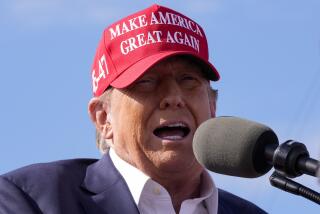Q&A: CEO of Aecom, builder of Rams’ stadium, sees big business in Trump’s infrastructure push
In the early morning following election day, President-elect Donald Trump claimed victory and highlighted one pledge in particular — to spend big, really big, on major infrastructure projects.
“We are going to fix our inner cities and rebuild our highways, bridges, tunnels, airports, schools, hospitals,” he told supporters in New York. “We’re going to rebuild our infrastructure, which will become, by the way, second to none. And we will put millions of our people to work as we rebuild it.”
By the end of that day, shares of Los Angeles engineering and construction giant Aecom — a firm that specializes in huge projects such as New York’s One World Trade Center and the Rams’ new football stadium in Inglewood — had jumped nearly 13% and have continued to climb.
Mike Burke, Aecom’s chief executive, told investors this week he’s never been more bullish on the North American infrastructure market. Much of that optimism has to do with state and local spending plans, including Measure M, the Los Angeles County measure that will provide billions of dollars funding for rail and other transportation projects.
Burke also likes the sound of more federal investment in roads, bridges and other infrastructure, but he says it’s not clear exactly what Trump’s plan will look like. There have been some hints, including a report from Trump’s economic advisors that indicates it will rely heavily on tax credits to promote private investment.
Burke spoke with The Times about his outlook on infrastructure spending and what he knows — and doesn’t know — about Trump’s infrastructure plan, including whether it would be able to channel private capital to projects in poor communities. Here’s an excerpt of that conversation.
Big infrastructure projects are Aecom’s forte. Is there excitement within the company that there’s a president-elect who has pledged all this investment in infrastructure?
I think both candidates were talking equally about infrastructure. When people asked me if I had a preference on a candidate, if the answer was limited to the benefit to our business, frankly, both candidates were saying the right things about infrastructure investment. But in the same election, we had over $200 billion in state and local ballot measures focused on infrastructure. I think it’s important to note that we are now at a really unique moment where there seems to be both political leadership and funding to meet these enormous infrastructure needs. I don’t think about it as just the Trump plan.
What do we know about President-elect Trump’s infrastructure plan and how it might work?
There are very few details available at this point, and I think there are more questions than there are answers. But I start from the premise that we’ve been under-invested in infrastructure here for decades. We’ve been spending about 2.5% of gross domestic product on infrastructure. Europe spends 5%; China spends even more. There’s an incredible need in America. The infrastructure gap here in America, according to the American Society of Civil Engineers, is an estimated $3.6-trillion shortfall. So Trump’s talking about spending $1 trillion — that doesn’t even close the gap.
Trump’s advisors have pitched what they say will be a revenue-neutral plan, and they seem to be tying that to getting corporations to bring money from overseas back to the U.S. Any idea how that might work?
Our sources in Washington would tell us that the most likely outcome is going to be a coupling of infrastructure investment with international tax reform. So there’s approximately $2 trillion of American corporate earnings offshore that have not been repatriated due to the nature of our income tax system. There seems to be momentum in Washington to fix the international tax deferral issue once and for all in a way that would allow us to repatriate a significant amount of that money in some way that would fund the infrastructure bill.
Would that mean charging a one-time tax on that repatriated money, or giving corporations a tax break if they invest some of it in infrastructure?
Trying to predict how this plays out is quite difficult as, like most things at this stage in a new administration, it’s theoretical. You could come at that a couple different ways. I don’t know that it’s important to handicap the different alternatives at this point.
The plan doesn’t call for much direct federal spending on projects. Instead, it calls for offering tax credits to private companies and investors to encourage them to build projects. Would that work?
It absolutely would. There’s a long history of using the tax-credit system to facilitate social policy. Look at low-income housing tax credits. Those have allowed companies to invest in low-income housing and get a tax credit for it to allow it to pencil out in a way that it otherwise wouldn’t. So that seems to be a blueprint that exists today for this concept.
How much interest is there from investors in infrastructure projects? Is there enough private capital to support the $1 trillion in investment Trump has talked about?
I have regular discussions with sovereign wealth funds and pension funds around the world that are begging to invest in infrastructure. There’s plenty of private-sector money.
One concern about Trump’s plan is that private investors will be less likely to invest in projects in poor communities. Would investors feel comfortable investing in a new water system in Flint, Mich., for instance?
It all depends on the security and the guarantees. In Flint, if there were a federal guarantee behind it, people would do it all day long. That’s a possibility. Whether Flint could cover the full cost of that without a federal intervention is questionable.
Follow me: @jrkoren








